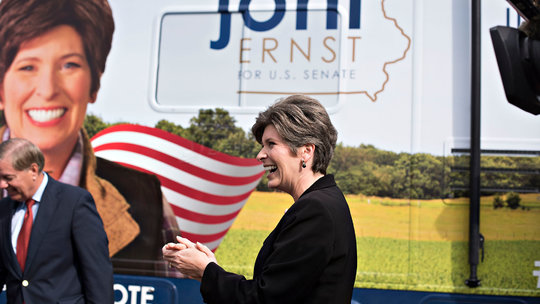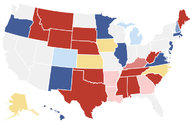
Going Viral and the Iowa Senate Race
A look at how viral ads have shaped one of this year’s crucial Senate races, between Representative Bruce Braley and his Republican opponent, Joni Ernst.
Video by Quynhanh Do on Publish Date October 28, 2014. Photo by Daniel Acker for The New York Times.HAMLIN, Iowa — Joni Ernst, the Republican Senate nominee in Iowa, motors along the state’s back roads in a tour bus festooned with giant images of herself, an American flag, a cornfield and the tag line: “Mother. Soldier. Independent Leader.”
She drops into county courthouses and small-town cafes, and introduces herself as “a southwest Iowa farm girl.” Her ads remind voters that, having commanded National Guard troops in Iraq, she could become “the first female combat veteran in the Senate.” She brought her 15-year-old daughter to Hamlin — living proof of the “mother” line in her résumé.
But in a state that is one of two that have never sent a woman to Washington or elected one governor (the other is Mississippi), there is one thing Ms. Ernst never does. She never appeals to Iowans to help her break the glass ceiling.
“I’m not running on my gender,” she insists.
By running to make history without saying so, Ms. Ernst, 44, is helping to write a new playbook for Republican female candidates. In a year that is proving challenging for women running for the Senate from both parties, Ms. Ernst has broken through with a powerful political message that has helped her build a surprisingly enthusiastic base of support — among men.

While Democrats rely on women — a key component of their base — to get elected, Republicans need the male vote to win. This holds true for candidates of both sexes from both parties.
Of the 15 female Senate candidates from the two major parties running this year, just two seem assured of victory: Susan Collins, the incumbent in Maine, and Representative Shelley Moore Capito of West Virginia, both of them Republican.
The other 13 are either trailing badly or, like Ms. Ernst, in tight races. Among incumbents, Kay Hagan of North Carolina, Mary L. Landrieu of Louisiana and Jeanne Shaheen of New Hampshire, all Democrats, are fighting to hang on to their seats. Two other bright Democratic prospects — Alison Lundergan Grimes in Kentucky and Michelle Nunn in Georgia — are in tough races in red states.
Ms. Ernst, who beat four men in the primary, stands out as the lone Republican woman in a cliffhanger campaign. If she beats her Democratic opponent, Representative Bruce Braley, in the race to succeed Tom Harkin, she will deprive Democrats of a seat they have held for nearly 30 years — and perhaps help Republicans take over the Senate.
“She’s a model for the Republican success story,” said Celinda Lake, a Democratic pollster. “They have run right-wing women before, but they haven’t had a right-wing woman before who was able to give so many gender-based cues while still maintaining their base.”
Analysts liken Ms. Ernst’s approach on gender to that of President Obama on race.
“You would be hard-pressed to find a clip of Senator Obama running in 2008 to be the first African-American president,” said Kellyanne Conway, a Republican pollster. She advises Republicans like Ms. Ernst against running “overtly as a woman.”
But Ms. Ernst is hardly ignoring her gender. Her ads offer a playful take on masculine endeavors. There she is firing a gun. There she is riding a Harley-Davidson. There she is boasting about “castrating hogs on an Iowa farm.”
Midterm Elections 2014

The latest news, analysis and election results for the 2014 midterm campaign.
But interspersed among those images are other, softer cues: In one new ad, she is seated at a kitchen table talking about “the Iowa we leave our children”; in another, she says she learned the “key to a great biscuit” while working at a fast-food restaurant.
Around the country, Democratic women are running more explicit appeals to women.
In Kentucky, an ad for Ms. Grimes features Democratic women in the Senate. “Shatter the glass. Break the ceiling. It’s time for Alison,” they declare. In Georgia, Ms. Nunn’s advertisement asks, of her Republican opponent, “Can the women of Georgia trust David Perdue?”
And in Iowa, Staci Appel, a Democratic House candidate, pitches herself as running “a race to elect the first woman to Congress from the state of Iowa” — even though the same could be said of Ms. Ernst.
If Ms. Ernst winds up in Washington, it will be largely because Iowa’s men sent her there. Ms. Ernst has a 12-point advantage among men deemed most likely to vote, while she and Mr. Braley are closely divided among such women, according to an NBC News/Marist College poll released this week. But in previous polls, Mr. Braley was doing much better among women — a hint that in the campaign’s waning days, Ms. Ernst may be narrowing the gender gap, as she makes inroads among older women.
In an election season in which Republicans have gained traction by talking about the threat of Islamic extremism, Ms. Ernst emphasizes her national security credentials — a strong sell with Republicans, and especially men.
Last week, she traveled the state with Senator Lindsey Graham, a South Carolina Republican and an Air Force reservist. Here in Hamlin, population 252 as of the latest census, Mr. Graham talked up Ms. Ernst’s military credentials to the dinner crowd at Darrell’s Place, a roadside restaurant where the pork tenderloin sandwiches sell for $5.25 and the beer signs flash in neon.
“It would be nice to have somebody in the Senate,” Mr. Graham said, “who doesn’t talk about boots on the ground, but has had her boots on the ground.”
Mr. Graham says Republicans are hungry for more candidates like Ms. Ernst. “We’re a party of short white guys,” he said self-deprecatingly, “and we need to reflect America.”
Nationally, Democrats have long outpaced Republicans in nominating women for high elective office, and 2014 has followed that trend. A recent analysis by the Center for American Women and Politics at Rutgers University found that there are twice as many as female Democrats running in Senate, House and governors’ races this year than there are Republican women.
Debbie Walsh, the center’s director, said Democrats had “more infrastructure” to support female candidates, through political action committees like Emily’s List. And Republican women tend to be more moderate and have difficulty surviving conservative primaries.
Ms. Ernst is an exception. Her breakout moment was the hog castrating ad, in which she vowed to rein in Washington’s “big spenders,” declaring: “Let’s make ’em squeal.” The ad delighted Republican men but made some Republican women queasy.
“When I saw that ad, I said, ‘Ew, I don’t know if I like that,’ ” said Christine Hensley, a member of the Des Moines City Council. Then, Ms. Hensley said, she mentioned it to Gov. Terry E. Branstad of Iowa, “and he said, ‘Isn’t that ad great?’ ”
If Mr. Braley has a hope of winning, said Ms. Lake, the Democratic strategist, it is by tying Ms. Ernst to the so-called Republican war on women. Recently, Mr. Braley campaigned with Cecile Richards, the president of Planned Parenthood, the reproductive rights organization, which has attacked Ms. Ernst for her anti-abortion stance and support of “personhood” rights for fetuses, using the slogan, “Women are watching.”
At the University of Iowa last week, Ms. Ernst was just four minutes into her stump speech promoting her “Iowa values,” when several young women began shouting her down. The scene grew so raucous that the candidate cut her talk short, ducking inside a classroom building to slip out a backdoor.
“Women are watching! Women are watching!” the protesters chanted as she left. Stacia Scott, a 22-year-old social worker who helped lead the protest, echoed Democrats’ talking points about Ms. Ernst. “Joni Ernst,” she said, “is not a woman for women.”
In the end, analysts say, the race may come down to the women’s vote. The question, said Dianne Bystrom, the director of the Catt Center for Women and Politics at Iowa State University, is this: “Are women going to turn out to defeat a history-making female candidate?”